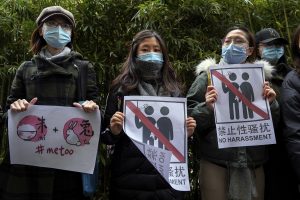In a rare burst of public protest, scores of demonstrators descended on a Beijing courthouse last week, waving home-made posters and chanting feminist slogans. They were there to support Zhou Xiaoxuan, also known as Xianzi, a young woman who filed a sexual misconduct case against famous TV host Zhu Jin two years back, accusing him of sexually harassing her when she was interning at China’s state broadcaster CCTV in 2014. Since then, she has become one of the leading faces of China’s #MeToo movement – and her landmark case was being heard for the first time.
As Xianzi stepped into the center of the crowd ahead of the long-awaited hearing, she wiped tears from her eyes and bowed with gratitude. “Xianzi, we’re here together with you!” one supporter shouted. Another threw her a scroll. She caught it, laughing with surprise. Unfurled, it displayed the characters “must win,” emblazoned in bold strokes of calligraphy.
The court adjourned after 10 hours without a verdict, and the next hearing has yet to be announced.
Since #MeToo exploded and spread across the globe, Chinese feminists have been fighting to sustain the movement in the face of intensifying crackdowns on collective actions and grassroots organizing, which have been exacerbated by the pandemic. This is true too for activists in Hong Kong, a city that has yet to experience a feminist uprising but is similarly grappling with sexual harassment and violence within the Chinese patriarchy.
Just weeks before Xianzi’s hearing, Hong Kong was hit with one of its biggest #MeToo cases since the movement went viral worldwide. More than 100 women came forward to accuse Gi Ka-man, a prominent local athlete and running coach, of sexual harassment, according to Apple Daily.
Allegations appeared in social media posts on Facebook, which sparked an outpouring of comments. In one post, a woman said he groped her breasts during a car ride in 2016. In another, a woman accused him of grabbing her hands and trying to bite her nose after a running practice in 2018, Coconuts Hong Kong reports. In response to these allegations, Gi since issued an apology on Facebook, which was ill received.
In Hong Kong, issues of sexual harassment and violence still fail to be taken seriously as structural problems in mainstream society, even after thousands marched to support victims under the rallying cry #ProtestToo during last year’s anti-government demonstrations.
Discouraged by social stigma and victim-shaming, many victims remain reluctant to speak out and seek the resources they require. When hurdling champion Vera Liu revealed in 2017 that she was sexually assaulted by her coach a decade back, some accused her of fame-seeking and questioned why she hadn’t come forward sooner. And after student protester Sonia Ng publicly accused the Hong Kong Police Force of sexual assault during her arrest last year, she received death threats over the phone.
Such challenges have only been exacerbated by the pandemic, which has not only confined victims to their homes – which, for some, are sites of abuse – but also cut survivors off from their support systems. Harmony House, a shelter for abused women and their children, reported a 25 percent rise in hotline reports of domestic violence between January and March. RainLily, a rape and assault crisis center, also saw a 30 percent increase in sexual violence reports in March.
A spokesperson at RainLily told The Diplomat that these cases fail to capture the magnitude of the problem, as most victims tend to hide or delay reporting on their abusive experiences.
“For quite a lot of our clients, the limited living space at home has created barriers for them to communicate emotions through online counselling. The experience of sexual violence remains a secret to their family,” the spokesperson said. He added that social isolation caused by coronavirus distancing restrictions caused “prolonged anxiety for many survivors.”
Moving forward, social workers and activists urge the government to increase support measures for victims by stepping up funding for NGOs, subsidizing shelters, publicizing support services, and strengthening public awareness on sexual harassment and violence.

































